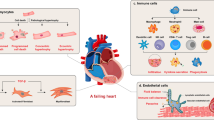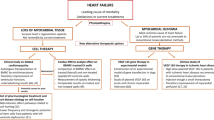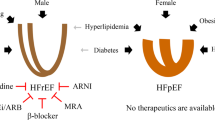Abstract
Heart failure (HF) is a common pathological end point for several cardiac diseases. Despite reasonable achievements in pharmacological, electrophysiological and surgical treatments, prognosis for chronic HF remains poor. Modern therapies are generally symptom oriented and do not currently address specific intracellular molecular signaling abnormalities. Therefore, new and innovative therapeutic approaches are warranted and, ideally, these could at least complement established therapeutic options if not replace them. Gene therapy has potential to serve in this regard in HF as vectors can be directed toward diseased myocytes and directly target intracellular signaling abnormalities. Within this review, we will dissect the adrenergic system contributing to HF development and progression with special emphasis on G-protein-coupled receptor kinase 2 (GRK2). The levels and activity of GRK2 are increased in HF and we and others have demonstrated that this kinase is a major molecular culprit in HF. We will cover the evidence supporting gene therapy directed against myocardial as well as adrenal GRK2 to improve the function and structure of the failing heart and how these strategies may offer complementary and synergistic effects with the existing HF mainstay therapy of β-adrenergic receptor antagonism.
This is a preview of subscription content, access via your institution
Access options
Subscribe to this journal
Receive 12 print issues and online access
$259.00 per year
only $21.58 per issue
Buy this article
- Purchase on Springer Link
- Instant access to full article PDF
Prices may be subject to local taxes which are calculated during checkout




Similar content being viewed by others
References
Rockman HA, Koch WJ, Lefkowitz RJ . Seven membrane spanning receptors and heart function. Nature 2002; 415: 206–212.
Huang ZM, Gold JI, Koch WJ . G protein-coupled receptor kinases in normal and failing myocardium. Front Biosci 2011; 17: 3057–3060.
Rengo G, Lymperopoulos T, Leosco D, Koch WJ . GRK2 as a novel gene therapy target in heart failure. J Mol Cell Cardiol 2011; 50: 785–792.
Jessup M, Greenberg B, Mancini D, Cappola T, Pauly DF, Jaski B et al. Calcium upregulation by percutaneous administration of gene therapy in cardiac disease (CUPID): a phase 2 trial of intracoronary gene therapy of sarcoplasmic reticulum Ca2+-ATPase in patients with advanced heart failure. Circulation 2011; 124: 304–313.
Phan HM, Gao MH, Lai NC, Tang T, Hammond HK . New signaling pathways associated with increased cardiac adenylyl cyclase 6 expression: implications for possible congestive heart failure therapy. Trends Cardiovasc Med 2007; 17: 215–221.
Lymperopoulos A, Rengo G, Koch WJ . Adrenal adrenoceptors in heart failure: fine-tuning cardiac stimulation. Trends Mol Med 2007; 13: 503–511.
Zhang GX, Kimura S, Nishiyama A, Shokoji T, Rahman M, Yao L et al. Cardiac oxidative stress in acute and chronic isoproterenol-infused rats. Cardiovasc Res 2005; 65: 230–238.
Cohn JN, Levine TB, Olivari MT, Garberg V, Lura D, Francis GS et al. Plasma norepinephrine as a guide to prognosis in patients with chronic congestive heart failure. N Engl J Med 1984; 311: 819–823.
Dzimiri N . Regulation of β-adrenoceptor signaling in cardiac function and disease. Pharmacol Rev 1999; 51: 465–501.
Ungerer M, Böhm M, Elce JS, Erdmann E, Lohse MJ . Altered expression of β-adrenergic receptor kinase and β1-adrenergic receptors in the failing human heart. Circulation 1993; 87: 454–463.
Penn RB, Pronin AN, Benovic JL . Regulation of G protein-coupled receptor kinases. Trends Cardiovasc Med 2000; 10: 81–89.
Sallese M, Mariggiò S, D’Urbano E, Iacovelli L, De Blasi A . Selective regulation of Gq signaling by G protein-coupled receptor kinase 2: direct interaction of kinase N terminus with activated Gαq. Mol Pharmacol 2000; 57: 826–831.
Dhami GK, Anborgh PH, Dale LB, Sterne-Marr R, Ferguson SS . Phosphorylation-independent regulation of metabotropic glutamate receptor signaling by G protein-coupled receptor kinase 2. J Biol Chem 2002; 277: 25266–25272.
Koch WJ, Inglese J, Stone W, Lefkowitz RJ . The binding site for the βγ subunits of heterotrimeric G proteins on the β-adrenergic receptor kinase. J Biol Chem 1993; 268: 8256–8260.
Lodowski DT, Pitcher JA, Capel WD, Lefkowitz RJ, Tesmer JJ . Keeping G proteins at bay: a complex between G protein-coupled receptor kinase 2 and Gβγ. Science 2003; 300: 1256–1262.
Touhara K, Koch WJ, Hawes BE, Lefkowitz RJ . Mutational analysis of the pleckstrin homology domain of the β-adrenergic receptor kinase. Differential effects on Gβγ- and phosphatidylinositol 4,5-bisphosphate binding. J Biol Chem 1995; 270: 17000–17005.
Ungerer M, Parruti G, Böhm M, Puzicha M, DeBlasi A, Erdmann E et al. Expression of β-arrestins and β-adrenergic receptor kinases in the failing human heart. Circ Res 1994; 74: 206–213.
Leineweber K, Brandt K, Wludyka B, Beilfuss A, Pönicke K, Heinroth-Hoffmann I et al. Ventricular hypertrophy plus neurohumoral activation is necessary to alter the cardiac β-adrenoceptor system in experimental heart failure. Circ Res 2002; 91: 1056–1062.
Lymperopoulos T, Rengo G, Funakoshi H, Eckhart AD, Koch WJ . Adrenal GRK2 upregulation mediates sympathetic overdrive in heart failure. Nat Med 2007; 13: 315–323.
Lymperopoulus A, Rengo G, Gao E, Ebert SN, Dorn II GW, Koch WJ . Reduction of sympathetic activity via adrenal-targeted GRK2 gene deletion attenuates heart failure progression and improves cardiac function after myocardial infarction. J Biol Chem 2010; 285: 16378–16386.
Harris CA, Chuang TT, Scorer CA . Expression of GRK2 is increased in the left ventricles of cardiomyopathic hamsters. Bas Res Cardiol 2001; 96: 364–368.
Gros R, Benovic JL, Tan CM, Feldman RD . G-protein-coupled receptor kinase activity is increased in hypertension. J Clin Invest 1997; 99: 2087–2093.
Choi D-J, Koch WJ, Hunter JJ, Rockman HA . Mechanism for β-adrenergic receptor desensitization in cardiac hypertrophy is increased β-adrenergic receptor kinase. J Biol Chem 1997; 272: 17223–17229.
Ungerer M, Kessebohm K, Kronsbein K, Lohse MJ, Richardt G . Activation of β-adrenergic receptor kinase during myocardial ischemia. Circ Res 1996; 79: 455–460.
Anderson KM, Eckhart AD, Willette RN, Koch WJ . The myocardial β-adrenergic system in spontaneously hypertensive heart failure (SHHF) rats. Hypertension 1999; 33: 402–407.
Ogletree-Hughes ML, Stull LB, Sweet WE, Smedira NG, McCarthy PM, Moravec CS . Mechanical unloading restores β-adrenergic responsiveness and reverses receptor downregulation in the failing human heart. Circulation 2001; 104: 881–886.
Akhter SA, D’Souza KM, Malhotra R, Staron ML, Valeroso TB, Fedson SE et al. Reversal of impaired myocardial β-adrenergic receptor signaling by continuous-flow left ventricular assist device support. J Heart Lung Transplant 2010; 29: 603–609.
Bonita RE, Raake PW, Otis NJ, Chuprun JK, Spivak T, Dasgupta A et al. Dynamic changes in lymphocyte GRK2 levels in cardiac transplant patients: a biomarker for left ventricular function. Clin Trans Sci 2010; 3: 14–18.
Williams ML, Koch WJ . Viral-based myocardial gene therapy approaches to alter cardiac function. Annu Rev Physiol 2004; 66: 49–75.
Vinge LE, Raake PW, Koch WJ . Gene therapy in heart failure. Circ Res 2008; 102: 1458–1470.
Lymperopoulos A, Rengo G, Zincarelli C, Soltys S, Koch WJ . Modulation of adrenal catecholamine secretion by in vivo gene transfer and manipulation of G protein-coupled receptor kinase-2 activity. Mol Ther 2008; 16: 302–307.
Brinks H, Koch WJ . Targeting G protein-coupled receptor kinases (GRKs) in heart failure. Drug Discov Today Dis Mech 2010; 7: e129–e134.
Bristow MR . Treatment of chronic heart failure with β-adrenergic receptor antagonists: a convergence of receptor pharmacology and clinical cardiology. Circ Res 2011; 109: 1176–1194.
Mann DL . Mechanisms and models in heart failure: a combinatorial approach. Circulation 1999; 100: 999–1008.
Leineweber K, Rohe P, Beilfuss A, Wolf C, Sporkmann H, Bruck H et al. G-protein-coupled receptor kinase activity in human heart failure: effects of beta-adrenoceptor blockade. Cardiovasc Res 2005; 66: 512–519.
Sigmund M, Jakob H, Becker H, Hanrath P, Schumacher C, Eschenhagen T et al. Effects of metoprolol on myocardial β-adrenoceptors and Gi α-proteins in patients with congestive heart failure. Eur J Clin Pharmacol 1996; 51: 127–132.
Kubo H, Margulies KB, Piacentino III V, Gaughan JP, Houser SR . Patients with end-stage congestive heart failure treated with beta-adrenergic receptor antagonists have improved ventricular myocyte calcium regulatory protein abundance. Circulation 2001; 104: 1012–1018.
Heilbrunn SM, Shah P, Bristow MR, Valantine HA, Ginsburg R, Fowler MB . Increased β-receptor density and improved hemodynamic response to catecholamine stimulation during long-term metoprolol therapy in heart failure from dilated cardiomyopathy. Circulation 1989; 79: 483–490.
Iaccarino G, Tomhave ED, Lefkowitz RJ, Koch WJ . Reciprocal in vivo regulation of myocardial G protein-coupled receptor kinase expression by β-adrenergic receptor stimulation and blockade. Circulation 1998; 98: 1783–1789.
Rengo G, Lymperopoulos A, Zincarelli C, Donniacuo M, Soltys S, Rabinowitz JR et al. Myocardial adeno-associated virus serotype-6-βARKct gene therapy improves cardiac function and normalizes the neurohormonal axis in chronic heart failure. Circulation 2009; 119: 89–98.
Brodde OE . Beta-adrenoceptor blocker treatment and the cardiac beta-adrenoceptor-G-protein(s)-adenylyl cyclase system in chronic heart failure. Naunyn Schmiedebergs Arch Pharmacol 2007; 374: 361–372.
Packer M . Current role of β-adrenergic blockers in the management of chronic heart failure. Am J Med 2001; 110: 81S–94S.
Freeman K, Lerman I, Kranias EG, Bohlmeyer T, Bristow MR, Lefkowitz RJ et al. Alterations in cardiac adrenergic signaling and calcium cycling differentially affect the progression of cardiomyopathy. J Clin Invest 2001; 107: 967–974.
Shah AS, White DC, Emani S, Kypson AP, Lilly RE, Wilson K et al. In vivo ventricular gene delivery of a β-adrenergic receptor kinase inhibitor to the failing heart reverses cardiac dysfunction. Circulation 2001; 103: 1311–1316.
Tevaearai HT, Eckhart AD, Shotwell KF, Wilson K, Koch WJ . Ventricular dysfunction following cardioplegic arrest is improved after myocardial gene transfer of a β-adrenergic receptor kinase inhibitor. Circulation 2001; 104: 2069–2074.
Raake PW, Schlegel P, Ksienzyk J, Reinkober J, Barthelmes J, Schinkel S et al. AAV6.βARKct cardiac gene therapy ameliorates cardiac function and normalizes the catecholaminergic axis in a clinically relevant large animal model of heart failure. Eur Heart J 2012 (in press).
Casey LM, Pistner AR, Belmonte SL, Migdalovich D, Stolpnik O, Nwakanma FE et al. Small molecule disruption of Gβγ signaling inhibits the progression of heart failure. Circ Res 2010; 107: 532–539.
Blaxall BC, Spang R, Rockman HA, Koch WJ . Differential myocardial gene expression in the development and rescue of murine heart failure. Physiol Genomics 2003; 15: 105–114.
Rockman HA, Chien KR, Choi D-J, Iaccarino G, Hunter JJ, Ross Jr J et al. Expression of a β-adrenergic receptor kinase 1 inhibitor prevents the development of heart failure in gene targeted mice. Proc Natl Acad Sci USA 1998; 95: 7000–7005.
Harding V, Jones L, Lefkowitz RJ, Koch WJ, Rockman HA . Cardiac βARK1 inhibition prolongs survival and augments β blocker therapy in a mouse model of severe heart failure. Proc Natl Acad Sci USA 2001; 98: 5809–5814.
Williams ML, Hata JA, Shroder J, Rampersaud E, Petrofski J, Jakoi A et al. Targeted β-adrenergic receptor kinase (βARK1) inhibition by gene transfer in failing human hearts. Circulation 2004; 109: 1590–1593.
Pleger ST, Shan C, Kszienyk J, Bekeredjian R, Boekstegers P, Hinkel R et al. Cardiac AAV9-S100A1 gene therapy rescues post-ischemic heart failure in a preclinical large animal model. Sci Transl Med 2011; 3: 92ra64.
Raake P, Vinge LE, Gao E, Boucher M, Chen X, Kerkela R et al. G protein-coupled receptor kinase 2 ablation in cardiac myocytes before or after myocardial infarction prevents heart failure. Circ Res 2008; 103: 413–422.
Voelkers M, Weidenhammer C, Herzog N, Qiu G, Spaich K, von Wegner F et al. The inotropic peptide βARKct improves βAR responsiveness in normal and failing cardiomyocytes through Gβγ-mediated L-type calcium current disinhibition. Circ Res 2011; 108: 27–39.
Lymperopoulos A, Rengo G, Zincarelli C, Soltys S, Koch WJ . Modulation of adrenal catecholamine secretion by in vivo gene transfer and manipulation of G protein-coupled receptor kinase-2 activity. Mol Ther 2008; 16: 302–307.
Gilbert EM, Abraham WT, Olsen S, Hattler B, White M, Mealy P et al. Comparative hemodynamic, left ventricular functional, and antiadrenergic effects of chronic treatment with metoprolol versus carvedilol in the failing heart. Circulation 1996; 94: 2817–2825.
Perrino C, Naga Prasad SV, Patel M, Wolf MJ, Rockman HA . Targeted inhibition of β-adrenergic receptor kinase-1-associated phosphoinositide-3 kinase activity preserves β-adrenergic receptor signaling and prolongs survival in heart failure induced by calsequestrin overexpression. J Am Coll Cardiol 2005; 45: 1862–1870.
Curcio A, Noma T, Naga Prasad SV, Wolf MJ, Lemaire A, Perrino C et al. Competitive displacement of phosphoinositide 3-kinase from β-adrenergic receptor kinase-1 improves postinfarction adverse myocardial remodeling. Am J Physiol 2006; 291: H1754–H1760.
Li Z, Laugwitz KL, Pinkernell K, Pragst I, Baumgartner C, Hoffmann E et al. Effects of two Gβγ-binding proteins--N-terminally truncated phosducin and β-adrenergic receptor kinase C terminus (βARKct)--in heart failure. Gene Therapy 2003; 10: 1354–1361.
Author information
Authors and Affiliations
Corresponding author
Ethics declarations
Competing interests
The authors declare no conflict of interest.
Rights and permissions
About this article
Cite this article
Reinkober, J., Tscheschner, H., Pleger, S. et al. Targeting GRK2 by gene therapy for heart failure: benefits above β-blockade. Gene Ther 19, 686–693 (2012). https://doi.org/10.1038/gt.2012.9
Received:
Revised:
Accepted:
Published:
Issue Date:
DOI: https://doi.org/10.1038/gt.2012.9
Keywords
This article is cited by
-
Chronic Sympathetic Hyperactivity Triggers Electrophysiological Remodeling and Disrupts Excitation-Contraction Coupling in Heart
Scientific Reports (2020)
-
Is GRK2 a new target for cardiovascular disease?
Hypertension Research (2018)
-
Altered sarcoplasmic reticulum calcium cycling—targets for heart failure therapy
Nature Reviews Cardiology (2012)



